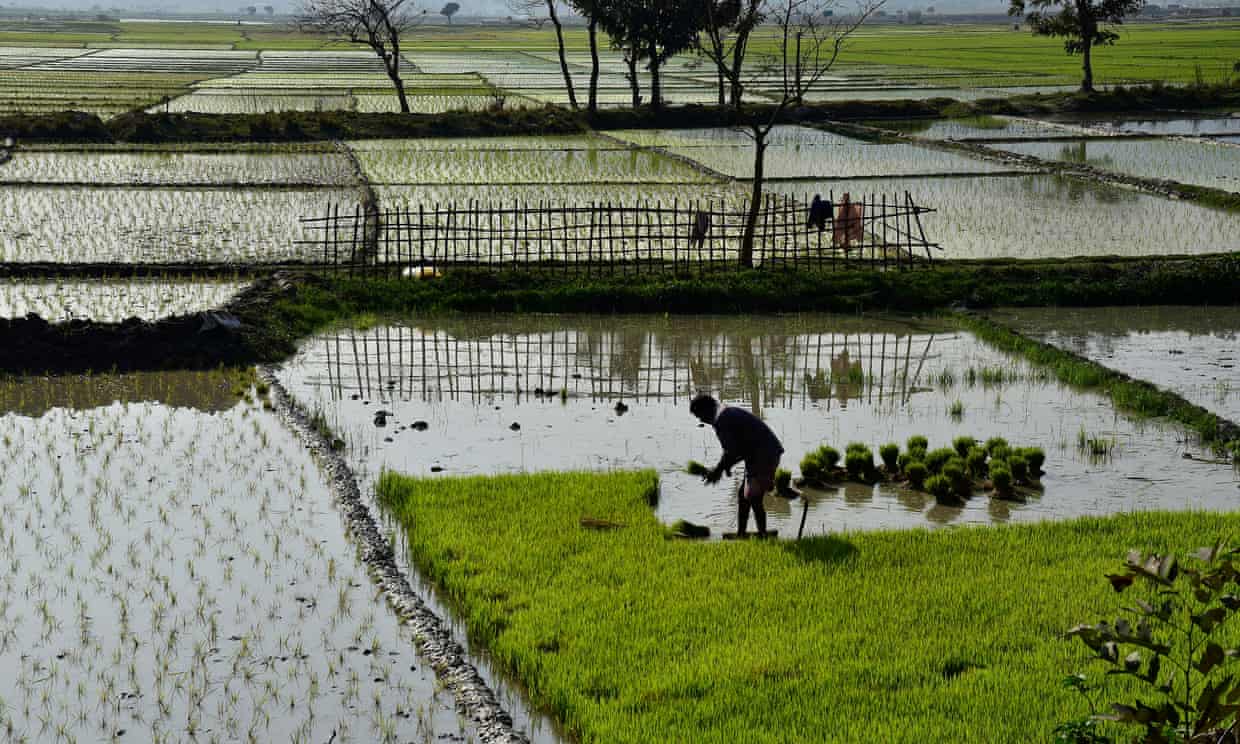
The Upside weekly report
Has the battle to feed humanity been won?
There’s been just enough good news to keep us going this week, and often an Upside surprises you
by Mark Rice-OxleySometimes the Upside pops up where you least expect it.
When my colleague Tracy McVeigh set off to Ghana to report on the practice of chaining mentally ill people to trees, it didn’t seem to offer much in the way of optimism. Indeed, the piece she wrote seemed just about as downside as you can get.
But journalism has a happy knack of making things happen. Within days of publication, the money started coming in from readers. Eventually, enough was raised to make a difference, as Tracy told me.
“So much money was raised that the mental health nurse was able to get Baba freed, clothed, hospitalised, and on medication,” she said. “His mum has been given a sustainable future income too through setting her up with goods to start her own market stall. Baba has been sitting in his hospital bed reading messages of support from Guardian readers and is talking again.”
So before we proceed to survey the Upside journalism of the week, we should not forget that sometimes some of the grimmest news stories can bring about good things too.
That said, it was a very good week for Upsiders everywhere, with the following pieces particularly worth dipping into:
• Wildfires are deadly. So how do you stop them happening in the first place? Three-minute read
• Floods are deadly. So how do you stop them happening in the first place? 90-second read

• Heroin overdoses are deadly. So etc etc etc. 30-minute podcast (I listened to the end)
• Obesity is … well you get the idea. Two-minute read
And finally this week’s prize for Upside prank-of-the-week-with-a-social-conscience goes to the people who unlocked London’s public toilets for all to use.
Lucky numbers
Some interesting thoughts here from Marian L Tupy at humanprogress.org: between 1968 and 2017, the world’s population increased by 113% from 3.55 billion to 7.55 billion. Over the same time period, the average global food supply per person per day jumped 27% to almost 3,000 calories.
The conclusion: “The battle to feed humans is over. Humanity has won.”
Separately, the EU cut carbon emissions by 12% in 2019 from the previous year – the largest single-year drop for 30 years.
What we liked
Solar-powered desalination plants seem like an innovation with no obvious downside. Here’s the latest from MIT.
This is cute: the band who will not fly to play at music festivals. There are echoes, here, of the band who won’t play festivals if there aren’t sufficient numbers of female musicians involved.

And finally, this is fascinating: a new touch-based language for the deaf-blind community, via Christian Science Monitor.
What we heard
You were brilliant this week, readers, on the subject of sad songs and bad news. (Brief recap: why are all the best songs sad; why is all the biggest news bad?)
Matthew Fernandez started out with a personal compliment, thereby assuring himself of a place in this newsletter:
Your son is a wise man. Sad songs make us think about how far we have gone through life. They help us sort through the echoes down the corridor. The loves we lost, the chances we missed and put it into a perspective that assists us in making sense of our lives and the paths that God has set for for us. Sad songs remind us that we are human and that in itself is beautiful.
I think Lou Reed was trying to articulate the same thing when he wrote this.
Matthew Campbell proved that this newsletter even gets read in New Zealand:
I find the whole Bob Dylan canon to be deeply sad (melancholy?) Even overtly upbeat songs. Why? I have no idea. But I don’t argue with genius.
Me neither.
Joe Lim had some profound views on the power of sadness:
Firstly, I feel that when a singer sings a sad song, we feel that the singer is ‘exposing’ his vulnerabilities (I put it in inverted commas as it is not really the singer’s vulnerabilities. If anything it belongs to the songwriters). We therefore feel we are able to connect better with the singer of the song.
Perhaps, sadness is a truer reflection of life than happiness, and subconsciously, we know that. Even if we ourselves live relatively comfortable lives, there are always people around the world who are suffering, either due to poverty, dictatorship or mental health problems. And we know this.
While Tim Mason took an evolutionary view:
Evolutionary psychologists would argue that fear and anxiety are more helpful to our genetic survival. That’s not quite the same as sadness, but maybe it’s related. Our genes don’t need us to be happy, just for us to survive. That’s rather sad too! All the same it is quite joyful to sing along with your mates down the pub or wherever!
Anna Chan was perceptive about the appeal of bad news:
Life for most people is quite dull and monotonous. I can only assume that bad news makes us feel a little better about our own lives and think “it could be worse”.
And Rebecca Metcalfe echoed that:
My theory is, people love hearing bad news/sad songs because they know they’re not going to be left feeling envious. We live in a world, now, where it is acceptable to brag. How many people look at social media and come away feeling their life is inadequate? Everything is about lifestyle – and invariably one that is unattainable for the majority. Cue bad news, sad songs etc. They offer respite from that gnawing feeling that everybody else has it better.
But Dawn Crist called for less gloom and doom:
Some people like the adrenalin rush that one supposedly gets from bad news, and some people who are depressed, actually like the idea of the world ending! In reality, gloom and doom does nothing but discourage us; it makes us panic, it raises our blood pressure and ultimately it is so discouraging that we stop trying!
We need good news, for sure, but the bad news can be presented in a problem-solving manner! Instead of harping on extinction, etc, etc, state the problem and then list ways that we can solve it! Invite people to take part and even come up with their own solutions! This excites people, and from that, hope is born! All of us must take charge, be creative and innovative! We can fix our problems and we can’t wait for governments to do it for us!
Where was the Upside?
With lovers everywhere. And for all you Valentine’s cynics who believe romance is just a trick of the mind, read Hannah Devlin’s exhaustive investigation into that age old question: what is love?
